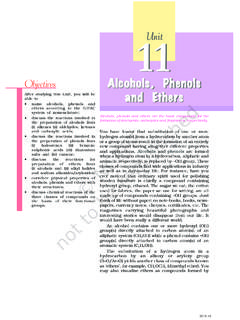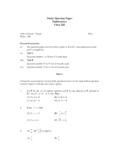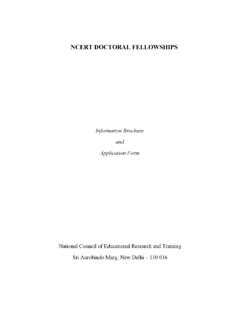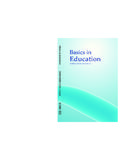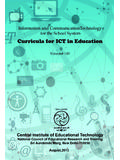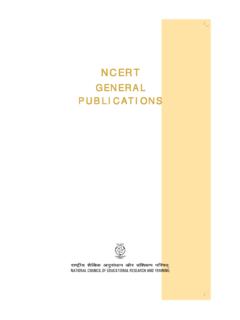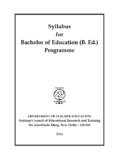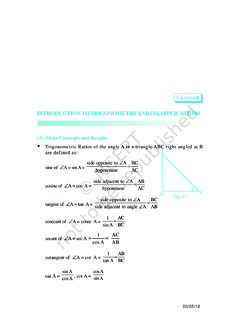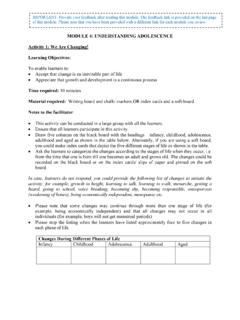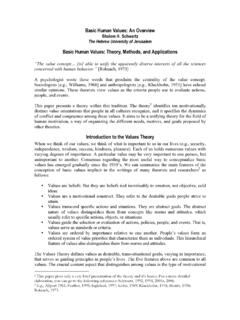Transcription of Environmental Education in National Policy Documents
1 Environmental Education in National Policy Documents National Policy on Education 1986 (With Modification Undertaken in 1992) Ministry of Human Resource Development National SYSTEM OF Education The National System of Education will be based on a National curricular framework which contains a common core along with other components that are flexible. The common core will include the history of India's freedom movement, the constitutional obligations and other content essential to nurture National identity. These elements will cut across subject areas and will be designed to promote values such as India's common cultural heritage, egalitarianism, democracy and secularism, equality of the sexes, protection of the environment, removal of social barriers, observance of the small family norm and inculcation of the scientific temper.
2 All educational programmes will be carried on in strict conformity with secular values. Education AND ENVIRONMENT There is a paramount need to create a consciousness of the environment. It must permeate all ages and all sections of society, beginning with the child. Environmental consciousness should inform teaching in schools and colleges. This aspect will be integrated in the entire educational process. National CURRICULUM FRAMEWORK FOR SCHOOL Education - 2000 National Council of Educational Research and Training 1. Context and Concerns Responding to the Impact of Globalisation Education should be the catalyst for the desire to live together in their own society on the one hand, and the global village on the other through the teaching of universal values such as tolerance and human rights, the diversity of cultures, respect for others and for the environment by searching for the right balance between the society's concerns and the integrity of the individual.
3 Education for Value Development Besides, curriculum in schools has to develop the key qualities like regularity and punctuality, cleanliness, self-control, industriousness, sense of duty, desire to serve, responsibility, enterprise, creativity, sensitivity to greater equality, fraternity democratic attitude and sense of obligation to Environmental protection. Integrating Diverse Curricular Concerns At a time when concerns such as `literacy', `family system', `neighbourhood Education ', ` Environmental Education ', `consumer Education ', `tourism Education ', `AIDS Education ', `human rights Education ', `legal literacy', `peace Education ', `population Education ', `migration Education ', `global Education ' and `safety Education ' are making a case for separate place in the school curriculum, the best approach would be to integrate these ideas and concepts, after a careful analysis in the existing areas of learning.
4 Appropriate strategies for this integration may be suitably worked out in the detailed subject curricula. Relating Education to World of Work Many skills can be taught through services which benefit the community as a whole, bringing the school close to its environs and helping the students become aware of their commitments to the school and the community. Cooperative activities can promote friendships, communal harmony and empathy for others. All vocational Education programmes and activities must stress the concept of sustainable development with a focus on fostering the awareness of the key Environmental concerns and the rights of all to a decent standard of living.
5 Toward a Frontline Curriculum Some of the learning areas that would deserve inclusion in this Frontline Curriculum right now could be the latest developments in communication system, space technology, biotechnology, genetic engineering, recent health issues, energy and environment, world geography, multinationals, archaeological findings and the like. 2. Organisation of Curriculum at Elementary and Secondary Stages Common Core Components The Fundamental Duties as laid down in Article 51A of Part IVA of the Indian Constitution, also have to be included in the core components. These are to: protect and improve the natural environment including forests, lakes, rivers, wildlife and to have compassion for the living creatures; Toward an Indigenous Curriculum Adequate attention shall have to be paid to the country's cultural plurality and the enormous amount of wisdom and experience that can be drawn from the various regions and sections of the Indian society.
6 It may also mean making judicious use of and drawing from traditional knowledge systems and solutions to issues of health, water management, population explosion etc. At a time when there is worldwide recognition and patenting of items like neem and turmeric, this kind of information must become an integral component of learners' knowledge. General Objectives of Education understanding of the environment in its totality both natural and social, and their interactive processes, the Environmental problems and the ways and means to preserve the environment; knowledge, attitude and habits necessary for keeping physically and mentally fit and strong in perfect harmony with the earth, water, air, fire and the sky; appreciation of the various consequences of large families and over population and need for checking population growth; Scheme of Studies A.
7 Classes I and II (a) One Language the mother tongue/the regional language (b) Mathematics (c) Art of Healthy and Productive Living Experiences to be provided in areas (a) and (b) will constitute an integrated whole taking into its fold, the natural and the man-made environment. Teaching and learning of language and mathematics would be woven around the environment of the learners and integrate Environmental concerns as well. B. Classes III to V (a) One language the mother tongue/the regional language (b) Mathematics (c) Environmental Studies (d) Art of Healthy and Productive Living Children will be provided with experiences to help their socio-emotional and cultural development with a realistic awareness and perception of the phenomena occurring in the environment.
8 This may be accomplished by emphasising, observation, classification, comparison and drawing of inferences through activities conducted within and outside the classroom. Science and Technology Primary Stage Science forms an integral part of learning at the primary stage. Essentially it has to be learnt mainly through concrete situations related to immediate environment during the first two years. The focus would be on sharpening senses of the learners and encouraging them to discover, observe and explore their environment and surroundings. This will lead to enrichment of the experiences, mostly on their own and supplemented occasionally by the teacher. The experiences and activities can be gradually structured during the remaining three years of primary Education where Environmental studies is to introduced.
9 The focus would, however, remain on objects, events, natural phenomena and learner's environment. Children would continue to learn to observe, explore and identify occurrences in their environment. Upper Primary Stage The environment should continue to be a major source of the learning and the students should try to understand the changes taking place all around. They would also gain an understanding of living world, balance of nature and the role of air, water and energy. Due emphasis should be given to conservation of natural resources..They can also be made aware of some of the local and global concerns and need to be constantly aware of these particularly in areas like drinking water, environment, health, nutrition and family welfare and others.
10 Secondary Stage Science, technology, society and environment would coalesce in teaching and learning of science at this stage. Teachers could help the learners devise appropriate experimentation and activities within the school and also outside school involving immediate environment such as farming, factories, industries and community. Social Sciences The component of social sciences is integral to the total quantum of general Education upto secondary stage. helps the learners in understanding the human environment in its totality and developing a broader perspective and an empirical, reasonable, and humane outlook. Food security, population growth, poverty, water scarcity, climatic changes and cultural preservation are some of the major issues of the twenty-first century, which have relevance for the social sciences curriculum.
